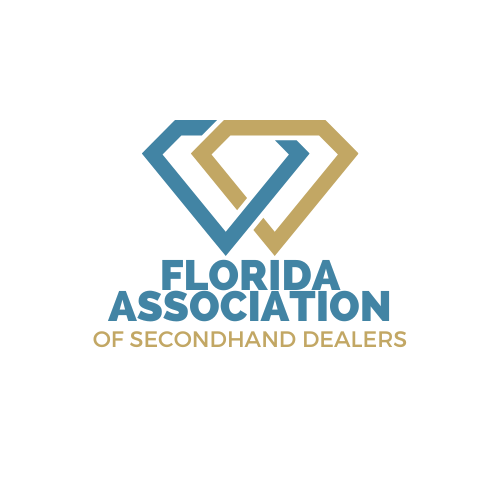MEMBER UPDATE
QUARTER 1 - MARCH 2025
With the legislative session well underway in Tallahassee, we have many updates to share! In this edition you’ll find a legislative update, a peek at our new “Heard Secondhand” insights, and info about our upcoming member briefing.
LEGISLATIVE UPDATE
FLASH has been actively representing you in Tallahassee! We attended the Senate Committee on Banking and Insurance (regarding SB 134, Sales Tax Exemption of Bullion) and the House Ways & Means Committee hearing (regarding HB 6021, Tax Exemption on Sales of Bullion) to show our support of these pro-business, pro-consumer initiatives.
We’re also watching a number of other bills of interest, including those related to acceptance of cash by businesses, gold and silver specie as legal tender, pawnbroker transaction forms and data bases, and Bitcoin!
CLICK HERE TO READ THE FULL LEGISLATIVE UPDATE
HEARD “SECONDHAND”
Beyond legislative activity, FLASH is also keeping an eye on activity affecting our industry.
“Roadshow” Legality
As part of our commitment to maintaining a fair and ethical secondhand goods industry in Florida, we want to bring attention to a growing concern: the increase in “roadshow” events hosted by out-of-state vendors. These events often take place at independent living facilities and other community spaces, promising residents a quick and convenient way to sell secondhand items like jewelry, coins, and collectibles. While these offers may seem harmless on the surface, we have serious concerns about the legality and oversight of these operations.
Many of these vendors appear to be operating without registering as secondhand dealers with the Florida Department of Revenue, and they often fail to comply with state requirements such as using licensed scales, recording purchases, and reporting transactions in accordance with Chapter 538 of the Florida Statutes. Without these protections in place, vulnerable populations are left unprotected, and the potential for fraud, exploitation, or the mishandling of stolen goods increases significantly.
These unregulated buying events also create an unfair playing field for law-abiding businesses in our community. As local secondhand dealers, we invest time and resources into compliance, including proper recordkeeping, reporting, and adhering to required holding periods. When out-of-state vendors skirt these rules, it undermines consumer trust and damages the reputation of our entire industry.
We are actively investigating this issue and have begun working with law enforcement and regulatory agencies to track these roadshow operators. If you are aware of upcoming or recent events of this nature, we encourage you to report them. Your vigilance helps protect both consumers and legitimate businesses.
Secondhand Transaction Form Burden
In addition to this enforcement concern, we’re also initiating a broader conversation about the administrative burden posed by the current state-mandated secondhand dealer database system. While we support the goal of helping law enforcement recover stolen property and uphold public safety, many dealers have expressed frustration with the system's complexity, time requirements, and technical challenges. We believe there is an opportunity to improve the database experience—making it more efficient for users while still maintaining its core purpose.
To that end, we are exploring the feasibility of a formal study aimed at evaluating how the database impacts day-to-day business operations and identifying potential improvements. This could include recommendations for more intuitive interfaces, better integration with point-of-sale systems, or revised reporting processes that reduce duplication of effort.
If your business is interested in participating in this research effort—either by sharing your experiences or contributing ideas—we invite you to connect with us. Your input could help shape practical, business-friendly reforms that benefit both the secondhand industry and the public we serve.
Together, we can strengthen the standards of our profession, protect vulnerable consumers, and promote responsible innovation in regulatory systems.



